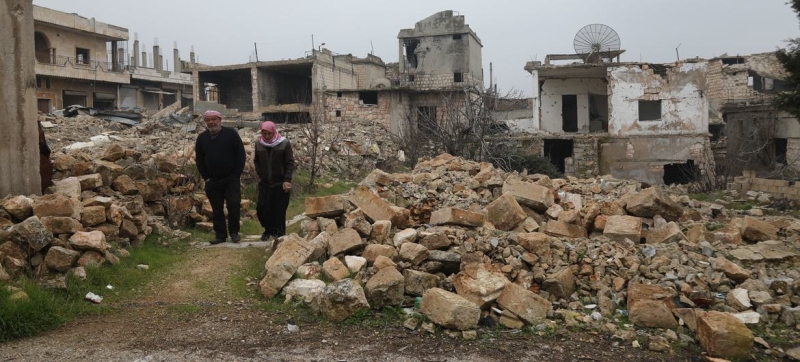
Erich area, Syria (file photo). UN chief concerned about violations of Syria’s sovereignty and territorial integrity Peace and security
The UN Secretary-General is deeply concerned about the recent large-scale violations of Syria’s sovereignty and territorial integrity, in particular hundreds of Israeli airstrikes in several areas of the country. This is stated in a statement by his press service. The UN chief stresses the need for de-escalation on all fronts.
The 1974 Separation of Forces Agreement remains in force, the statement said. António Guterres condemns all actions inconsistent with the Agreement. He called upon the parties to comply with their obligations under this document, including by ending any unauthorized presence in the area of separation, and to refrain from any actions that could undermine the ceasefire and stability in the Golan Heights.
During this volatile period, the Secretary-General stresses the need for credible, orderly and inclusive transitional arrangements in Syria to maintain public order.
Arbitrarily arrested in Syria
The UN Special Envoy for Syria, Geir Pedersen, said today that footage from Sednaya and other detention facilities showed the “unimaginable barbarity” that Syrians had endured for years. Yet the available documentation and testimonies only scratch the surface of the horrors of the prison system and the suffering of detainees and their families, Pedersen said. He called for decisive action.
“The families of those detained, missing and recently released urgently need support, including medical, psychological and legal assistance, as well as safe shelter. “Detention sites, mass graves and related documentation must be preserved to assist families in their quest for justice and accountability,” the Special Envoy said in a statement delivered in Geneva on Thursday.
Read also:
The Path to Peace in Syria: Big Opportunities, Serious Risks
Pedersen called for a priority to be given to accounting for missing persons, ensuring that families receive the information they need. Evidence of atrocities committed, he said, must be preserved and carefully documented to ensure accountability under international humanitarian law. Justice for victims and their families is not only a right, but a necessity – to “heal” societies and prevent further violations, the Special Envoy stressed.
He also called on all parties and relevant specialized organizations to focus on the humanitarian needs of people recently released from prison and families still searching for their loved ones. “Countless children, women and men continue to be arbitrarily detained by various forces. They must be released immediately,” the UN envoy said.
The Special Envoy called on all parties to cooperate with the UN’s specialized bodies, including the Independent Institute for Missing Persons (IIMP), the International, Impartial and Independent Mechanism (IIIM) and the Independent International Commission of Inquiry on Syria (CoI), as well as all relevant international and national institutions working on these issues.
“The world has a responsibility to listen, to act and to work tirelessly to create a future where such horrors are never repeated,” Pedersen stressed.
Chemical Weapons
The UN-backed Organisation for the Prohibition of Chemical Weapons (OPCW) is preparing to send a team of experts to Syria “as soon as the security situation allows.” That is one of the outcomes of an emergency meeting convened on Thursday by OPCW Director-General Fernando Arias.
He recalled that under the Assad regime, Syria never disclosed its full chemical weapons programme, despite its repeated use of them.
“The political and security situation in the country remains volatile… The ultimate goal is to achieve the complete dismantling of Syria’s chemical weapons programme and to engage in a process of bringing the former Syrian government and any other perpetrators found to be responsible to international responsibility,” the OPCW noted.
Syria joined the Chemical Weapons Convention 11 years ago. The OPCW Technical Secretariat has been working for years to address gaps and inconsistencies in the chemical weapons data initially provided by Syria, and the issue is regularly addressed by the UN Security Council. Syria must now comply with all of its obligations under the convention by abandoning what remains of its chemical weapons programme, Arias said.
Humanitarian Aid
Meanwhile, the World Food Programme (WFP) has announced an expansion of aid across Syria. Nearly 14 years of war have left many Syrians in dire straits. As of early 2024, some 12.9 million people were food insecure.
Distribution of food and hot meals to displaced people has already resumed in Homs, Aleppo, Raqqa and Hasakah after days of instability.
“Commercial supply routes are currently under threat, food prices are skyrocketing and the Syrian currency is depreciating. Essential commodities such as rice, sugar and oil are in short supply and bread prices have risen sharply, so it is vital that we step up our efforts to deliver aid this winter,” said WFP Syria Country Director Kenn Crossley.
WFP needs an additional $250 million over the next six months to procure and deliver food assistance to 2.8 million people.
